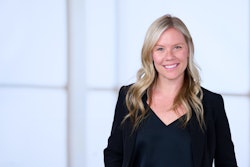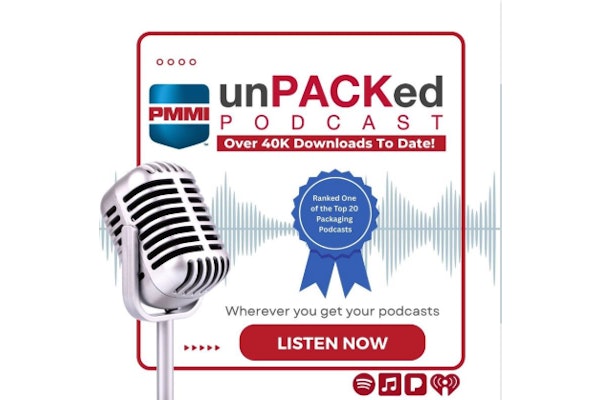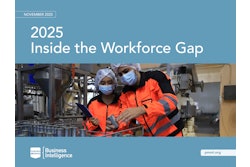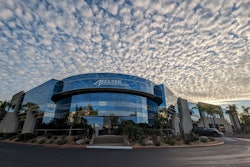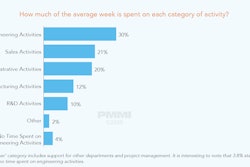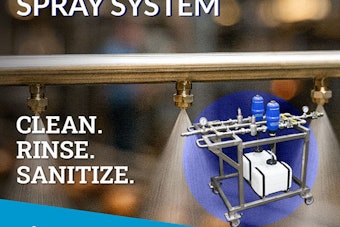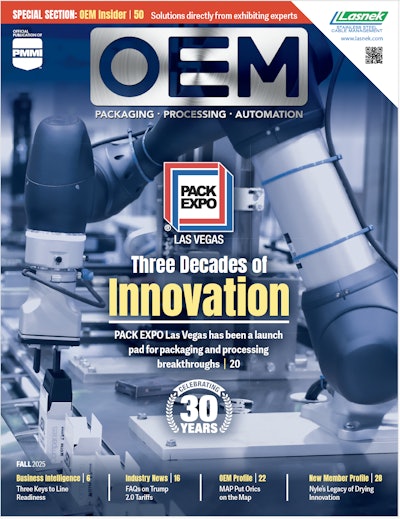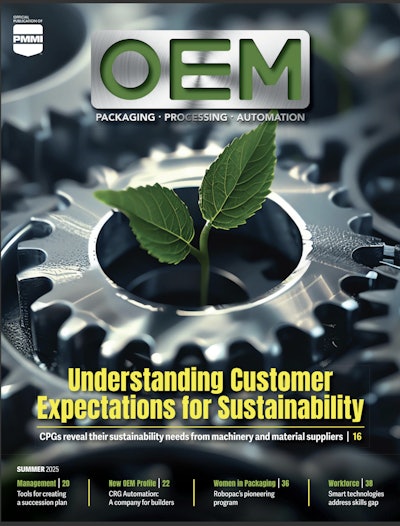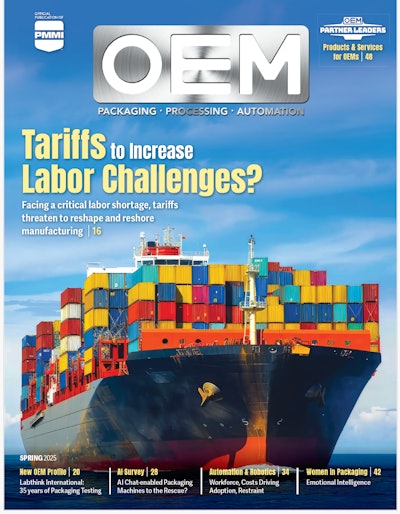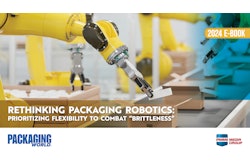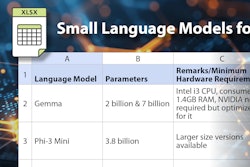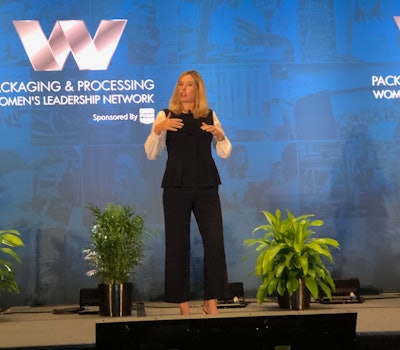
During the Packaging & Processing Women’s Leadership Network (PPWLN) breakfast which took place at PACK EXPO International in Chicago this past October, keynote speaker Dawn Hudson shared stories and advice to an audience of about 1,000 people. In a podcast with OEM editor-in-chief Stephanie Neil, Hudson reflects on some of the experiences during her career at Pepsi and the NFL, and offers some guidance for women adjusting to challenging circumstances. Here is an excerpt of that conversation. (Or scroll to the bottom to hear the full podcast!)
Neil: You said in the beginning of your keynote that you didn't set out to build a career in a man's world, but that's exactly what happened to you. Can you briefly bring us through that journey?
Hudson: Sure. I grew up outside of Boston… I went to Dartmouth College, and there were very few women there when I went…I will tell you, as much as I learned from my coursework, when you're in an overall environment of 10% women and 90% men and there are no sororities and no college centers for the women to hang out at, you learned to find other ways [to get by]. I became very good friends with many of the women that I was there with. But also, I learned to be friends with men, to compete in the classroom with men, to compete on sports fields with men. And I didn't realize it was part of my education, but it was.
After Dartmouth I went into advertising, which seemed to be a good fit with me. I'm analytical on one side and creative on the other and that industry supports both. Today, the advertising industry is more than 50% women. At the time, it was 10% women. And, unfortunately today, it still doesn't have enough women at the senior ranks and it definitely didn't have women at the senior ranks then, so my Dartmouth experience was just carried over into advertising. I went on from there to work with a variety of clients including Frito-Lay. Frito then hired me…And from there I went to Pepsi in the marketing department, became chief marketing officer, eventually became president and then CEO of about a $5.5 billion division.
But what was really interesting to me about Pepsi is at the time I was there, the bottling system was a franchise organization and it was 100 bottlers, from small family-owned businesses with seven trucks to multi-billion dollar publicly traded companies. And 99 of the 100 were men. And so the big part of my job was trying to get alignment with this group that really invested their capital into making new products and putting them on their trucks and investing in launching them. I went out and got to know a lot of the men, I got to know their families, and it served me well. From there I ended up going to a consulting firm. But when we sold that firm to Ernst & Young and I was trying to figure out what to do, Roger Goodell at the NFL, whom I had worked with at Pepsi, offered an opportunity for me to go to work for them.
Neil: When you walked into the NFL what kind of reception did you get?
Hudson: I did feel like I was stepping back in time and I think that, while people outwardly supported me, I had to prove myself and I had to come to the table with something different. I wasn't [initially] embraced and brought into the fold, but I would say six months later I very much had great relationships pretty much across the senior team. When I joined the NFL, it was literally in the middle of the Ray Rice domestic violence incident. And when organizations are under real stress and times of challenge, they change more and they have to act differently. So all of a sudden, I had a set of skills in my past, having fought the cola wars and been in Washington to defend soft drinks against obesity, that was very valuable in that environment. And I had a female perspective. So I really had to partner with everyone from the head of football operations to how we were communicating with the players to obviously PR to working with the media group. And I think that cemented and made me feel very much part of the team more quickly than ordinarily would've happened had I got into a business as usual, everything's going great situation.
Neil: So, you're walking into a crisis, but do you feel like maybe your perspective as a woman was an advantage here to shift the narrative?
Hudson: Oh, I think absolutely. First of all, it was a few other of the women at the NFL that had already started down a path. I literally joined the NFL and took my mom to Africa and safari to play out something I'd planned for a long time. And I came back and the Ray Rice video had gone viral while I was gone. So there were a set of people already starting to work on some initiatives, and they were women.
I'm always someone that used data…One in four people in this country are affected by domestic violence. We must listen, learn, and figure out what can we do to help. And so the first thing we did was make people aware of the issue, [and to] know that there's help out there. Then as we started to get toward the Super Bowl, we learned that we were really growing awareness and there was a lot more outreach to these services…Anyone in that situation, regardless of sex or race or creed, they need a community to help them get out of that situation. So that's what we focused on in the playoffs and it led to a Super Bowl commercial. But I do believe that a female perspective, and personal knowledge through others, and a team of women that I was working with certainly helped. And that didn't mean that there wasn't male perspective in it too.
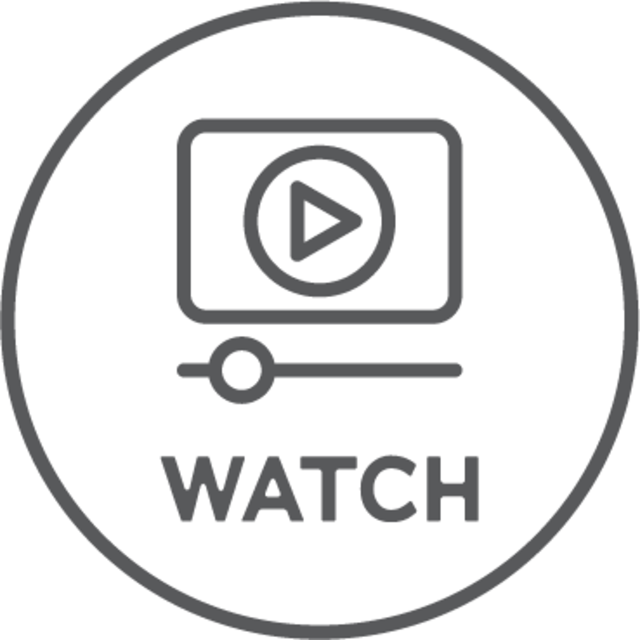 | Watch the NFL's Super Bowl 2015 commercial addressing domestic violence. |
Neil: I want to switch gears a little bit here and ask you, who are the band of sisters?
Hudson: The band of sisters, we are a group of six women who grew up at PepsiCo and some of us were there for over 20 years. I was there for 11 years. But we were in a really great time at the company where we were growing share, having fun, and we really made friendships that as we all, at different times, left PepsiCo to go on to our next company or experience, we carried those relationships forward. So we were six women who got together at an event and started talking and laughing about some of the things that happened to us back in those early days of Pepsi working with this very male-dominated bottling system. And we ended up talking about, not #MeToo moments, but these little mini moments that occurred during the day out on a business trip that you laugh at looking back at, but you also cringe because they're uncomfortable. But you'd take a subject and all of a sudden we'd all start talking about it. We ended up becoming passionate about helping younger women enter their career with our advice about how to handle these little situations, and how men and women in the room might help when they see something like this happening.
Neil: And the book you wrote, tell us about the title.
Hudson: So we wrote a book…31 chapters and we tried to give them catchy handles. One of the chapters was called, “You Should Smile More.” The six of us were talking about things that have happened to us in performance reviews. And it's never happened to me that somebody has told me that I should smile more, but for my other five sisters, every one of them had that circumstance where somebody had given them that feedback. And we asked men if you've been told to smile more, they're not told to smile more. And smiling more is more personal. Can you work harder with the sales group? Can you develop your public speaking? I mean, have you built the best promotional program integrated with Salesforce? Those are functional things you could talk about. [Smiling] is a personal thing and that shouldn't come into a business review. So we all had a lot of chats on what we should call the book, and we thought that one connected with women.
Neil: Any advice for women entering a male-dominated industry like manufacturing?
Hudson: So it's really important that as you enter a different culture that you make sure you bring your whole self to work and you voice, again, in a nice way, how things could be done differently. Or if you have a certain dressing style and they don't dress that way, still dress that way because that's you and that's your personality. And I think that over time, you will connect better with people if you're being yourself, you're being authentic. Coming in and trying to be something that you're not usually doesn't win in terms of connecting with people.
Second, make sure that you find a sponsor, male or female, likely male, but somebody who you can go to. Well first, there's a mentor that you can go through for advice, how to handle this situation. And generally speaking, mentors are lateral or just a little bit ahead of you and they give you good advice but they're people you have lunch with that you have fun with. But the sponsor is probably somebody you don't interact a lot with. Maybe it's the person that hired you, maybe it's the person that runs your department, but you want to develop that relationship with a sponsor so you can go to them for help. And they're in a more powerful position to then advocate for you. So think about developing your own network of mentors and sponsors.
Listen to this podcast:


